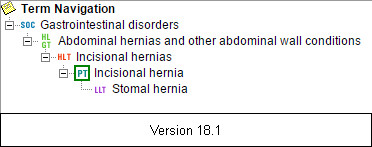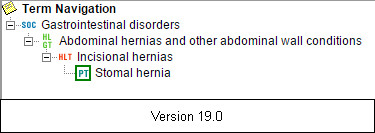 A new version of the Medical Dictionary for Regulatory Activities (MedDRA) has just been released. Last week’s blog post gave a brief introduction to MedDRA and this week I’ll look at some of the changes in the latest version, 19.0.
A new version of the Medical Dictionary for Regulatory Activities (MedDRA) has just been released. Last week’s blog post gave a brief introduction to MedDRA and this week I’ll look at some of the changes in the latest version, 19.0.
A new System Organ Class
The biggest change in the latest MedDRA version is the addition of Product issues as a new System Organ Class (SOC). Remember that device terminology as such doesn’t fall within the scope of MedDRA, but device failures and quality issues do. Some new terms have been entered in this SOC, but most have been transferred from other SOCs. For example, device leakage has been moved from General disorders and administration site conditions to Product issues.
Product issues has two High Level Group Terms:
Product quality issues are defined as abnormalities that may be introduced during the manufacturing/labelling, packaging, shipping, handling or storage of the products. They may occur with or without clinical consequences.
A Spanish-English aside
Let’s stray slightly off topic to look at the challenges of translating product and device in Spanish. In Europe, and specifically for EU regulatory translations, medical device is translated as producto sanitario. I was surprised that this term isn’t mentioned in MedDRA.
British spelling is used throughout MedDRA except for LLTs, where both UK and US spelling variants are included. However, the Spanish translation of device as dispositivo médico in MedDRA is clearly influenced by Latin American variants. And product is simply producto.
As usual, Fernando Navarro’s Libro rojo in Cosnautas1 already has these language variants covered:
Reproduced with kind permission of the author. Click the image to enlarge.
New PTs, demotions and promotions
New terms
Version 19.1 has a total of 21,920 PTs, 367 of which are new.1 Here are three examples of new preferred terms:
If you’re not sure what the abbreviations stand for, check out the flowchart in last week’s blog post.
Demotions
A total of 84 PTs have been demoted. For example, mental retardation was a PT and is now an LLT:
Promotions
A total of 25 LLTs have been promoted. For example, stomal hernia was an LLT and now it’s also a PT:
Importance of updates for translators
Clearly, translators need to be aware of the new additions in Version 19.0. If your source text is up to date and the author is well versed in MedDRA, this won’t be a problem because your terminology search will lead to the correct, current translation.
Promotions and demotions are also relevant for translators because PTs and LLTs are used for different genres and contexts (see previous blog post for more details).
Make sure you keep up to date with the changes. If you have a MedDRA subscription, download the latest version for your desktop browser. If you use EUTCT for access, you’ll have to be patient, because it’s still running version 18.1.
References:
1 Fernando A. Navarro: Diccionario de dudas y dificultades de traducción del inglés médico (3rd edition). Version 3.06. Madrid: Cosnautas, January 2016.
2 MedDRA Introductory Guide Version 19.0, March 2016.
Copyright notices:
MedDRA® the Medical Dictionary for Regulatory Activities terminology is the international medical terminology developed under the auspices of the International Conference on Harmonisation of Technical Requirements for Registration of Pharmaceuticals for Human Use (ICH).
MedDRA® trademark is owned by IFPMA on behalf of ICH.










Pingback: (MULTI) - MedDRA: new version 19.0 | Emma ...
Pingback: (MULTI) – MedDRA: new version 19.0 | Emma Goldsmith – Glossarissimo!